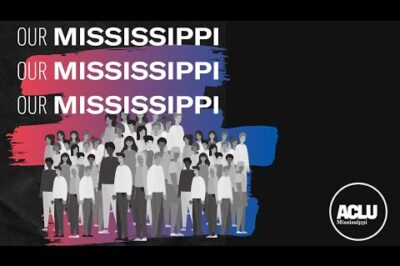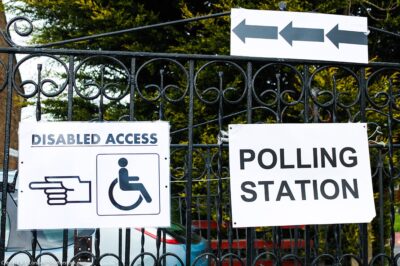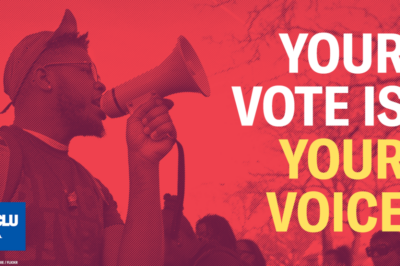Voting Rights Act
NEWS
On 40th Anniversary of Voting Rights Act, ACLU Says Law Still Needed
PUBLICATIONS
> The Voting Rights Act: What It Has Meant and What Is at Stake
> Voting Rights Project History
> The Voting Rights Act of 1965: What Expires in 2007 and What Does Not
> Comprehensive Voting Rights Act Timeline
> Remembering Bloody Sunday: Anniversary Is Reminder of Importance of Voting Rights Act
On a cold day in early March 1965, more than 500 peaceful demonstrators set off from Selma, Alabama, to the state capitol in Montgomery. They marched to protest the continued disfranchisement of blacks in the South and the murder of a young unarmed black man, shot by police while trying to protect his mother and grandfather from being beaten by state troopers after a civil rights meeting.
As the marchers began to cross the Edmund Pettus Bridge outside Selma, they were assaulted by a phalanx of state and local police in riot gear. The peaceful demonstrators were beaten with billy clubs and sprayed with tear gas in full view of national television cameras. The brutality sparked national outrage, and marked a turning point in the American civil rights movement. President Lyndon Johnson called the attack “wrong, deadly wrong.”
Five months after this “Bloody Sunday,” a united Congress passed the Voting Rights Act of 1965, which has become one of the most successful civil rights laws in America’s history.
FORTY YEARS OF PROGRESS
In the 40 years since its passage, the Voting Rights Act has guaranteed millions of minority voters a chance to have their voices heard and their votes counted. The number of black elected officials has increased from just 300 nationwide in 1964 to more than 9,100 today, and the poll taxes, literacy tests and other discriminatory barriers that once closed the ballot box to blacks and other minorities have been dismantled.
The act also opened the political process for many of the nearly 5,000 Latinos who now hold public office, including more than 250 who serve at the state or federal level.
THE 2007 REAUTHORIZATION
The 1965 law was never meant as a quick fix. Recognizing that many states, counties and cities continued to erect barriers to minority political participation, no fewer than four presidents – Nixon, Ford, Reagan and George H.W. Bush — supported the expansion of key parts of the law.
Notably, each time the law has been renewed by Congress, a Republican president has ratified the bill. On signing the 1982 extension, which passed the House of Representatives by a vote of 389 to 24, President Reagan called the right to vote the “crown-jewel” of American liberties.
In 2007, however, three crucial sections of the Voting Rights Act will expire unless Congress votes to renew them. These include:
- A requirement that states with a documented history of discriminatory voting practices submit planned changes in their election laws or procedures to federal officials or judges for preclearance. A bipartisan Congressional report in 1982 warned that without this section, discrimination would reappear “overnight.”
- Provisions that guarantee access to bilingual election materials for some Native Americans who have limited English proficiency and new citizens trying to learn the language.
- The authority to send federal examiners and observers to monitor elections.
A CONTINUING NEED
The expiring provisions of the Voting Rights Act remain essential to ensure fairness in our political process and equal opportunity for minorities in American politics. Although great strides have been made in reducing discrimination, the ideal of “one person, one vote,” is still just that – an ideal.
In South Dakota, for example, a recent court decision detailed two decades of systematic voting rights abuses against Native Americans. In the South, every redistricting plan submitted by Louisiana legislators for federal preclearance has been rejected by both Democratic and Republican attorneys general. In places like Los Angeles, Chicago and New York City, voters with limited English proficiency continue to face resistance, unfair practices and poll workers who don’t follow the law.
At a time when America has staked so much of its international reputation on the need to spread democracy around the world, we must ensure its vitality here at home.
PUBLICATIONS
> Remembering Bloody Sunday: Anniversary Is Reminder of Importance of Voting Rights Act, Statement of Anthony D. Romero, executive director of the ACLU
> The Voting Rights Act: What It Has Meant and What Is at Stake, Press Statement by the Director of the ACLU Voting Rights Project, Laughlin McDonald
> History of the Voting Rights Project
> The Voting Rights Act of 1965: What Expires in 2007 and What Does Not (PDF version)
> Voting Rights Act Brochure
> Comprehensive Voting Rights Act Timeline (HTML)
Stay Informed
Every month, you'll receive regular roundups of the most important civil rights and civil liberties developments. Remember: a well-informed citizenry is the best defense against tyranny.




